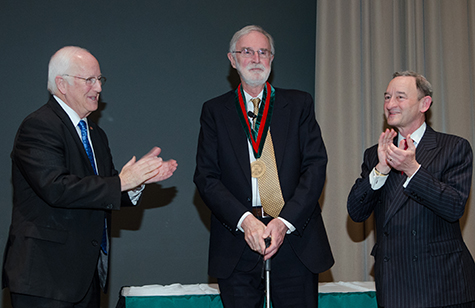
Marcus E. Raichle, MD, has been named an inaugural Alan A. and Edith L. Wolff Distinguished Professor of Medicine at Washington University School of Medicine in St. Louis.
Raichle is a professor of radiology, psychology, biomedical engineering, neurobiology and neurology. His many honors include the 2014 Kavli Prize for Neuroscience. He shared the $1 million prize with two other neurologists for research into the roles brain networks play in memory and cognition.
Raichle joined the School of Medicine faculty in 1971. He worked with Michel Ter-Pogossian, a pioneer of positron emission tomography (PET), and applied PET and other imaging techniques in groundbreaking studies that revealed key aspects of brain function and organization.
“Marc Raichle is one of the world’s premier neuroscientists,” Chancellor Mark S. Wrighton said. “His studies helped uncover the hidden functional architecture of the human brain, and I cannot overstate the importance of these structures to our modern understanding of how the brain works in health and disease.”
Added Larry J. Shapiro, MD, executive vice chancellor for medical affairs and dean of the School of Medicine: “One of Marc Raichle’s key insights was to recognize that many revealing brain activities occur when we’re not consciously doing anything with our minds. The discovery created a whole field of science and made possible many different branches of research that are leading to new ways to diagnose and treat brain injuries and neurodegenerative disorders.”
Raichle, a Seattle native, noted with amusement at the installation that 43 years ago he and his wife had thought they were coming to St. Louis for just a few years. He called the university a “spectacular place to be” and expressed his thanks to colleagues, staff and students, and for the new named professorship.
“Having the kind of support provided by this chair is very special to any scientist,” Raichle said. “It’s an honor, and it gives me the flexibility to be creative and come up with new ideas, and I’m very grateful to the Wolffs for their exemplary generosity.”
For many years, Raichle and other researchers scanned the brains of volunteers in research studies as the subjects performed mental tasks, such as looking for a target, listening for a sound or reading a word. By tracking changes in brain blood flow during the activities, the researchers identified the brain regions involved in mental tasks.
But Raichle noticed that as subjects focused on mental activities, the changes in blood flow triggered by the tasks only accounted for a fraction of the brain’s oxygen use. In an accidental discovery, his laboratory found that energy use in certain regions of the brain consistently decreased when volunteers began cognitive tasks. This led them to conduct a series of brain scans with a key difference: They asked the volunteers to just relax.
It soon became clear that certain brain regions were more likely to be abuzz with activity when volunteers did nothing and that this activity dropped as participants took up mental tasks. Raichle and others established that the activity was part of a previously unrecognized brain system they called the default mode network. They have amassed evidence that the network helps the brain organize memories and envision the future, helping the brain to prepare its response for events that may be minutes, days, months or years in the future.
Impairments in the default mode network may be connected to a wide range of neurological disorders, including Alzheimer’s disease, depression and schizophrenia. The default mode network also is helping scientists understand the complex ways the brain responds to injuries such as stroke and concussion.
Raichle is a member of the Institute of Medicine and the National Academy of Sciences, and a fellow of the American Association for the Advancement of Science. In 1999, he was the first to receive the university’s Carl and Gerty Cori Faculty Achievement Award. His many honors have included the MetLife Foundation’s Award for Medical Research and the Peter Raven Lifetime Achievement Award of the St. Louis Academy of the Sciences.
He earned his medical degree in 1964 at the University of Washington in Seattle.
About the Wolffs
Alan and Edith Wolff owned Wolff Construction Co., a real-estate development, investment and management company. Alan Wolff founded the company in the 1940s and led it until his death in 1989. Edith Wolff then took up leadership as the company’s president until her death in 2008.
Over the course of more than 30 years, gifts from the Wolffs have supported many areas of research at the School of Medicine, including projects involving Alzheimer’s disease, heart transplantation, bacterial sepsis infection, dermatology, cell biology and critical care medicine. They have provided funding for 13 endowed professorships, seven distinguished endowed professorships and specific research funds in cancer and ophthalmology. Their donations also support the Edith L. Wolff Scholarship Loan Fund, a noninterest-bearing fund for medical students.
In 2007, Edith Wolff committed $20 million to establish the Alan A. and Edith L. Wolff Institute at the School of Medicine, with the goal of advancing the most promising biomedical research projects focused on preventing, treating and curing disease.
In recognition of her generous support of medical research, Edith Wolff received numerous awards from Washington University, including the Robert S. Brookings Award, the Second Century Award from the School of Medicine and an honorary doctorate in 2004.
Comments and respectful dialogue are encouraged, but content will be moderated. Please, no personal attacks, obscenity or profanity, selling of commercial products, or endorsements of political candidates or positions. We reserve the right to remove any inappropriate comments. We also cannot address individual medical concerns or provide medical advice in this forum.